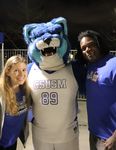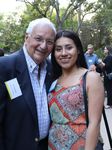COBA PROFESSIONAL MENTOR PROGRAM - GUIDELINES 2020-2021 - CSUSM
←
→
Page content transcription
If your browser does not render page correctly, please read the page content below
What is the
T he CoBA Dean’s Office and
CoBA PMP?
Advisory Board oversee the
Professional Mentor Program
that Stone Brewing Company supports.
The Professional Mentor Program creates collaborative
relationships between local business professionals and students in
the current business programs. These mentor relationships are not
designed to “get students a job;” they are meant to open doors for
networking opportunities that allow students to learn about a
particular industry, the day-to-day responsibilities in a particular
functional area or position, the cultural fit with companies of
interest, and for mentors to advise students on how to best develop
themselves to become leaders in their chosen field. These
relationships may also open doors to unadvertised hiring needs
within an organization. Each fall the program kicks off with
mentors and mentees setting goals and expectations for the year.
For 2020-21, the Professional Mentor Program will be in a
virtual environment.
Mission Statement
Providing students connections to professionals who will help
them plan for and execute career goals directly related to their
fields of interest while also enhancing their employability skills.
2Am I Eligible to Participate?
C
oBA students who are currently enrolled part-time or
full-time and are in business status are eligible to
apply as mentees. Students must also have completed
the BUS 300 course with a passing grade. Typically,
professionals who have had at least five years of work
experience are eligible to participate as mentors.
3W
e ask that mentors and
mentees meet at least once
How Much per month. Students should
Time Do I expect to put in 2-5 hours of preparation
and meeting time as they are the
Need to “drivers” in this relationship. Mentors are
asked to provide at least 1-2 hours per
Commit? month.
Following the CDC guidelines, we ask that
meetings be held virtually during the
2020-2021 academic year.
How Do I Benefit?
If you are a student you If you are a professional
will: you will:
• Establish a professional • Help students achieve
relationship. professional goals.
• Have support in enhancing soft
skills. • Utilize (and enhance) your
• Increase knowledge of career leadership and business expertise.
options.
• Gain confidence in setting life • Gain insight from emerging
and career goals. professionals.
• Discuss ways of balancing work
and personal life.
• Gain a sense of personal and
professional development.
4Student Expectations Beyond Driving the
Relationship
A
t the end of the year, students will submit a one-page (or more)
reflection on your experience in the program and outcomes as
they relate to the goals you set with your mentors. We
expect you to journal often and take notes when meeting with your
mentor or their colleagues so that you can reflect upon your journey.
Program Contacts
Jill Laing Emilie Hersh Virginia Appleton
Director of Executive in Residence Program Support
Student Success Program Lead Assistant
jlaing@csusm.edu ehersh@csusm.edu vappleton@csusm.edu
5Important Events
Virtual Student Virtual
Mentee Professionals Mid-Year Event
Orientation Orientation
TBD
Required Required
Attendance Attendance
6Setting You Up For Success
Communicating Clear Expectations
C
oBA strongly recommends that mentors and mentees
clearly communicate expectations early in the relationship.
We also encourage both parties to only attend virtual
events during the 2020-2021 academic year.
• Make this discussion a priority for the first virtual meeting or
phone call, so that each party understands the responsibilities to
which he or she is agreeing.
• Mentees should be prepared to verbalize what they would like to
gain from the mentorship, and in what ways the mentor’s help
would be most beneficial.
• Mentors should be prepared to respond to the mentees about
what he or she can work toward or promise, as well as identify
potentially unrealistic expectations.
Clearly communicating expectations from the beginning not only
sets a standard for honest communication and mutual
responsibility, but also decreases the possibility of
misunderstandings later on.
7Setting Realistic Goals and
Objectives
C
oBA strongly recommends that at the onset of the mentoring
relationship, the mentee and mentor identify goals and
objectives to achieve during the mentorship. It is also
encouraged that each mentor-mentee pair address whether goals
and objectives are realistic. Keep in mind that the scope of
accomplishments should be attainable within the single semester
time frame of the program.
• Mentoring pairs should avoid unrealistic expectations, such as
swift advancement, "quick-fixes" on employment issues, or
immediate integration of new professional skills and ideas.
• Mentors can use their knowledge of the market or of a particular
industry to help manage the mentee's expectations of what can be
accomplished during the course of the semester, and which
objectives may take longer to reach.
• If realistic goals and objectives are not agreed upon, please con-
tact the designated CoBA representative to help ensure success.
8Recommended Mentoring
Program and Activities
C oBA recommends that mentors and mentees jointly
develop an Action Plan that focuses on achieving goals
and objectives during the semester-long engagement. The
achievement of benchmarks should be monitored regularly and
reassessed when necessary. The plan should allow for at least
four “significant discussions” to take place during the length of
the program.
CoBA also recommends that mentors and mentees consider a
variety of activities (see page 18 for suggestions) throughout the
course of their mentoring relationships, so that goals remain
fresh and activities varied. Varying mentoring activities will help
build a strong foundation, as well as make the mentorship more
dynamic and sustainable. Consider activities that range from
career-focused to social, and which take place one-on-one, or
with other mentor-mentee pairs.
9Step Career Assessment and
1 Objectives
T
he Career Assessment & Objectives Questionnaire (Appendix
1 and 2) should be completed by the mentee prior to the first
meeting and discussed with the mentor in order to determine
an Action Plan.
The mentee should also share CareerLeader Assessment results
with the mentor. Mentees should be honest and realistic about their
needs and objectives, and mentors will need to recognize what they
can deliver before committing to a particular outcome.
CoBA recommends the remainder of Step 1 be spent building a
relationship between the mentor and mentee in which both parties
get to know each other beyond their professional experiences and
career goals. The best mentoring relationships are built around
trust, mutual respect, and open communication. Some suggestions
to help with Step 1 are:
• Establish a top-5 list of realistic and achievable goals to be met
over the course of the mentorship.
10Career Assessment and
Objectives (Continued)
• Devise a complete semester-long Action Plan with strategies for
meeting each benchmark.
• Discuss current events, news, politics or other areas of mutual
interest.
• Go over the intangibles of professional success, such as attire,
grooming, organization of desk/office and managing free time.
• Both share about impact of past mentors/role models and how
they impacted your life or career.
• Describe the most challenging moment in your career and how
you dealt with it, or discuss “things I learned on my own that I wish
someone had told me.”
11Step Networking Enrichment
2
I
n many cases, the mentee will benefit from being introduced to
other professionals within the mentor’s company or network.
This lends the opportunity for the mentee to learn about
different lines of work, or to meet others who may be considered
role models and may offer alternate perspectives in line with the
mentee’s objectives.
Ideally, the mentee will be introduced to 3 professionals during
this step so that he/she can engage in further discussion and in-
teraction with those professionals. Some suggestions to help with
Step 2 are:
• Attend the mentor’s company's virtual networking events
together, conduct virtual office tours, and introduce the mentee to
colleagues.
• Prepare for and attend a job fair together, and network with
other professionals at the fair (for 2020-21, virtual job fairs only).
• Discuss conversation starters that can be used at virtual
networking events.
12Networking Enrichment
(Continued)
• Help the mentee enhance their "elevator pitch".
• Temporarily “swap” mentees with another mentor or spend
time with other mentor-mentee pairs in the program.
• Give the mentee a writing assignment or other project and have
him or her work through several revisions with colleagues (or
writing specialists) in the company.
• Learn a new computer application or workflow together and
have a colleague or friend give you both a tutorial.
13Step Job Preparation and Career
3 Development
C
oBA recommends that mentors offer assistance with various
skills required of mentees who will be applying for a job or
building a career. Examples may include third party skill,
assessment, personality typing (example: Myers-Briggs),
resume review, interview training and public speaking.
Furthermore, mentors may refer to the CSUSM Career Center for
additional help in guiding mentees with their career- related
needs. Mentors may also wish to engage their corporate Human
Resources department. Some suggestions to help with Step 3 are:
• Review professional resume and send the mentee’s resume to
friends and colleagues for feedback.
• Mentor and mentee can set up LinkedIn profiles.
• Invite the mentee to present at the mentor’s office virtual
meetings.
• Help the mentee assemble a professional portfolio including
work samples and writing samples, academic transcripts and
records, performance evaluations, complimentary emails/praise,
letters of recommendation, and copies of diplomas, awards and
certificates.
14Job Preparation and Career
Development (Continued)
• Watch interviews on YouTube and critique them together. Utilize
Interview Stream for recorded interview practice and mentor can
review and provide feedback.
• Set up virtual mock interviews for the mentee with Human
Resources professionals or other managers at the mentor’s
company.
• Mentor and mentee can videotape each other conducting a
practice interview or public speaking, and then review and give
feedback.
• If the mentee is transitioning careers, brainstorm ways of
highlighting transferable skills in a manner that is clear to those in
the new field of choice.
• Discuss how to negotiate salary, ask for a promotion/raise, and
make requests of superiors.
• The mentee can identify 3-5 companies he or she is interested in,
and schedule virtual informational interviews at these companies.
The mentor and mentee can work together to prepare a list of
talking points for the interviews. If the mentor has a relationship
with someone in one of the listed companies, an introduction
would be helpful.
15Step Program Recap &
4 Professional Networking
T
he final step should commence with a review of the mentee’s
original Career Assessment and Objectives Questionnaire to
determine if the original objectives are on a path toward
being realized. The remainder of this step may be best spent
assisting the mentee in building their professional network.
Ideally, the mentor will introduce the mentee to three other
professionals from outside the mentor’s corporation. Mentors and
mentees may wish to discuss the ways the mentee can continue his
or her own professional development beyond the program. Some
suggestions to help with Step 4 are:
• Meet virtually one-on-one to review the mentee’s original
objectives.
• Contact friends and colleagues who can give the mentee
helpful tips about how to carry on brief, effective, pitch-oriented
conversations.
16Program Recap &
Professional Networking (Continued)
• Attend a company virtual sales expo, listen to sales pitches, and
network with people at the event.
• Attend a virtual charity event, or gallery opening together and
attempt to connect with at least two people and learn about their
line of work.
• Start a collaborative project that requires outreach to professionals
at different companies.
• Begin developing 2-year, 5-year and 10-year plans for network
growth for both the mentee and mentor and compare them.
• Brainstorm ways of fresh and current networks.
17Example Timeline of Activities
Example Timeline of Activities
MONTH ACTIVITY SUGGESTIONS
September Program Pre‐Survey (All)
Mentee/Mentor Orientations Exchange contact information and set
(MANDATORY) expectations.
October Goal Setting Talk to students about goal setting and
creating a timeline for success in the job
search.
Resumes could be reviewed by mentor or
students should be encouraged to visit the
CSUSM Career Center.
November Virtual Job shadowing Invite student to a virtual job shadow.
Student could set up a virtual informational
Virtual Office Tour interview with a company or organization
they would like to work at (discuss
Virtual industry networking experience with mentor afterwards).
events. Invite mentee to a professional virtual
conference or networking event.
December Open Topic
Mid‐Year Survey (All) • Discuss trends in the industry.
January
Background/Industry Changes • Invite a colleague or two to join your
Mid‐Year Event (Tentative) discussion.
February Community Service
Choose a community service activity to
participate in.
Discuss community service organizations of
interest.
March Financial Planning Discuss salary negotiations, personal
budgeting, retirement, etc.
April
Final Survey (All)
18Appendix 1- Career Assessment
CoBA encourages mentees to complete these pages prior to your
first meeting with your mentor in order to develop a course of
action for the year together.
Instructions: Respond to each statement by choosing a number
1-5 which is most true for you.
Scale 1 = Strongly Agree
2 = Agree
3 = Maybe, not certain
4 = Disagree
5 = Strongly Disagree
1. I know what motivates me to excel at work.
2. I can identify my strongest abilities and skills.
3. I have three major achievements that clarify a pattern of interest and
abilities that are relevant to my career.
4. I know what I both like and dislike in work.
5. I know what I want to do during the next 1-2 years.
6. I know what I want to do during the next 5-10 years.
7. I have a well-defined career objective that focuses my job search on
particular organizations and employers.
8. I am going back to school and considering different career options.
9. I know what skills I can offer employers in different occupations.
10. I know what skills employers seek in most candidates.
11. I can clearly explain to employers what I do well and enjoy doing.
12. I can clearly and succinctly explain why employers should hire me.
13. I want to start/have started a small business and would like assis-tance
in building it.
19Appendix 2- Objectives
1. Circle or highlight all that apply.
2. List your top three objectives in the open fields at the bottom of the
page.
I would like a mentor to help me:
-Identify which career fields best suit my skills, interests and experience.
-Learn about various careers in numerous industries.
-Build a network of professionals in a variety of industries.
-Learn about career opportunities in a particular industry.
-Learn how to advance at my current job.
-Learn how to deal with a difficult boss, colleague, or fellow student.
-Learn how to start my own business.
-Learn how to build a business I have already started.
-Determine if I should go further my education.
-Make sure I am on the right path toward my desired career after I obtain
my degree.
-Better deal with work/life balance issues.
-Improve my resume and my interview skills.
-Translate my background to a new field.
-Learn the language and culture of Corporate America.
-Get along better with my peers.
-Build lasting relationships with those in the civilian world.
-Other ___________________________________________________
Top Three Objectives
1:________________________________________________________________
2:________________________________________________________________
3:________________________________________________________________
Adapted from American Corporate Partners http://www.acp-usa.org/
20
Mentoring_ProgramYou can also read





















































